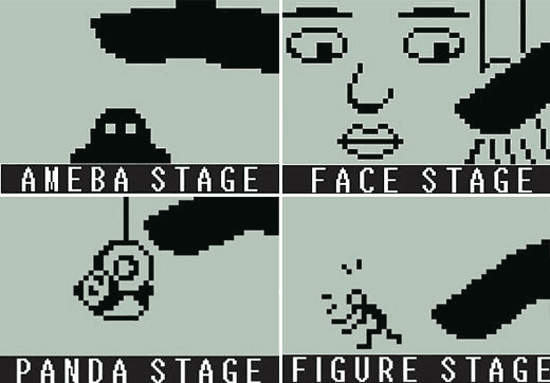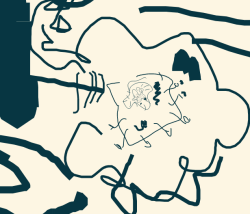This is an interesting iPad app which allows the user to draw vectorized sketches which can be zoomed into as far as the creator has drawn.
These images don't do the idea justice so click here to explore some completed sketches!
Constructing Interactive Space
Research, thoughts and development
Tuesday, January 1, 2013
Thursday, November 1, 2012
Tuttuki Bako
I just saw Tuttuki Bako today on a website. It's quite innovative I think and serves to remind just how limited we can be in the ways we think about interactivity.
This new interactive toy from japan involves sticking your finger in a hole on the side of the box to interact with a virtual environment. Bandai’s new Tuttuki Bako handheld interactive plaything requires you to twiddle your finger around inside the orifice to play with a variety of virtual characters on an LCD screen on the front of the device. There are six play modes ranging from pushing around a tiny little person, to ticking someone’s nose, to petting a pint-size panda bear.


Sunday, October 28, 2012
Sought
Sought is a narrative driven maze game with multiple endings. It's interesting because of the way the story is told - the player is presented with an introduction and is left to piece together a larger picture through an array of different endings that can be completed in any order. The interactions themselves are very simple with the desire to learn more about this strange world the main motivation for progressing. I haven't seen many free indie games with voice acting so that's also something that drew me to this game which is just as much a short story than anything else.
Monday, October 1, 2012
Developing 3D Space
I've been experimenting further with 3d spaces in a project which is shaping up to being quite unique in terms of both concept and aesthetic.
Mapping these spaces can be quite challenging as the editor
I'm working in is entirely two dimensional. The image above shows a screenshot
of game play placed next to the grid based layout which the world is designed
in. The biggest issue with this interface is that there is no real allowance
for a display of depth meaning that positions and shapes of objects must be
kept track of mentally. To add additional complication to this method, I have
been experimenting with non-Euclidean spaces such as endless corridors and
impossible rooms. This is all very much an illusion and so the mapping of such
can become rather hectic as resources are placed over the top of one another
from a frustratingly static birds eye perspective.
 In terms of narrative flavour, I've been quite inspired by
Kafka's short story Metamorphosis in which the protagonist awakens as an
insect. This concept and the absurdist nature in which it is depicted offers
interesting parallels to the way we as humans perceive space. Just how direct
this influence will become I am not quite sure but at the moment it is a good
starting point to build from.
In terms of narrative flavour, I've been quite inspired by
Kafka's short story Metamorphosis in which the protagonist awakens as an
insect. This concept and the absurdist nature in which it is depicted offers
interesting parallels to the way we as humans perceive space. Just how direct
this influence will become I am not quite sure but at the moment it is a good
starting point to build from.
As far as game play is concerned, I don't think there will be any real mechanical or reflex based challenges in the game. Instead I'm opting for a more thoughtful explorative pace where the challenge becomes the navigation of the world itself. A simple premise such as collecting objects or reaching gateways to new areas could be a possible 'goal' if one is to be had.
Sunday, September 9, 2012
Invisible Cities
As well as writing I've been developing an aesthetic around the 3d spaces I
was working on a month or so ago. It's monochromatic, full of static and
distortion but quite 'clean' at the same time. This seems like the perfect mode
to explore non Euclidean laws through. I have a title, it's 'Invisible Cities'
- a space of warped geometry, philosophy and isolation. I'm not exactly sure
what this means or what I will do with the idea but for now, here's a glimpse of
what it looks like so far:
Saturday, September 8, 2012
Super Press Space To Win
It's been a while! I've been busy working on starting my thesis so I didn't
do any updates last month. I think the blog is a powerful research tool and I
really don't want it to become neglected as this project continues. Because of
this I'm going to try and get things back on track by keeping up with the posts.
 Super Press Space To Win is described by the author as an 'Action RPG'
and is ultimately a parody of RPG convention, dealing with many of the tropes
of the genre through a simple system of interaction which utilises only a
single button (the space bar). RPGs have been criticised for some time about
the repetitiveness of certain mechanics (battling monsters, collecting items)
so this game plays on that repetition by using one button to do everything.
Additionally, the linearity of a lot of these games is highlighted, SPSTW will
doing things like ask the player a yes or no question but since only a single
button is employed, there is no way to choose a different answer.
Super Press Space To Win is described by the author as an 'Action RPG'
and is ultimately a parody of RPG convention, dealing with many of the tropes
of the genre through a simple system of interaction which utilises only a
single button (the space bar). RPGs have been criticised for some time about
the repetitiveness of certain mechanics (battling monsters, collecting items)
so this game plays on that repetition by using one button to do everything.
Additionally, the linearity of a lot of these games is highlighted, SPSTW will
doing things like ask the player a yes or no question but since only a single
button is employed, there is no way to choose a different answer.
I think the game is interesting because it's one of the best examples I've
seen which demonstrates the illusion of control on part of the player. The only
way to 'oppose' the games mechanics is to simply 'not' press space. The
frequency between presses and time spent reading text affords the player more
agency than the game perhaps realises. I wonder if it would be possible to make
a game where the player has literally zero agency in the progression and
manipulation of game space but still perceives themselves as having some sort
of control.
Also, the game has quite cool, over dramatic voice acting!


Tuesday, July 17, 2012
Perceptions Of Space
I have been creating 3 dimensional environments exploring the possibilities of virtual space. Initially I was just experimenting with the world, trying to think of ways to implement non-Euclidean geometries inspired by the games I looked at in my previous post.
When coding the virtual camera there is a parameter that defines the field of view of the screen. I accidentally entered the 'wrong' number and discovered some pretty exciting results that enabled the field of view to extend beyond that of a human eye. This produces some pretty warped and twisted visuals that completely disorient the player - a fish-eye-like effect hat can be extended to impossible extremes.
Beyond
the visual intrigue of this experiment, such technique opens up a unique
dialogue in the discussion of virtual space. Bending the 'field of
view' effects the virtual camera, adjusting the way which we as an
audience experience a space. The significance of this is that despite
appearances, the actual game space remains unchanged, objects occupying
the same coordinates of Cartesian space despite the apparent ocular
aberrations which may occur.
It is not the space that is changing, only our perception of it.
This
concept highlights the relativity of our own spacial experiences; we
expect virtual worlds to behave a certain way based upon the
understandings we have of our own and when they don't conform, these
spaces become powerful mechanisms of affect.
 |
| Space perceived from a 'normal' field of view |
 |
| The same space, viewed from a distorted perspective |
Subscribe to:
Posts (Atom)










